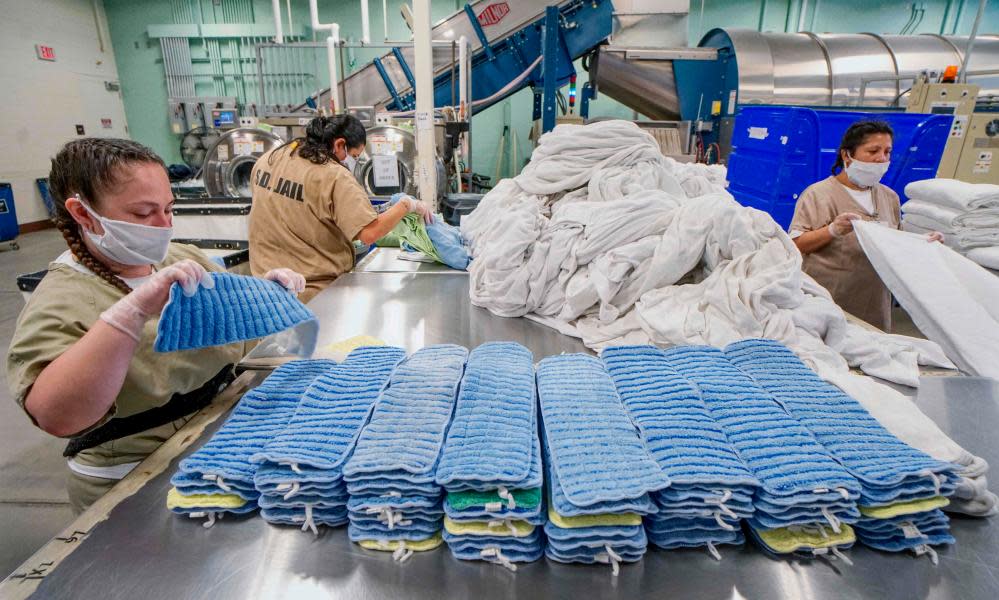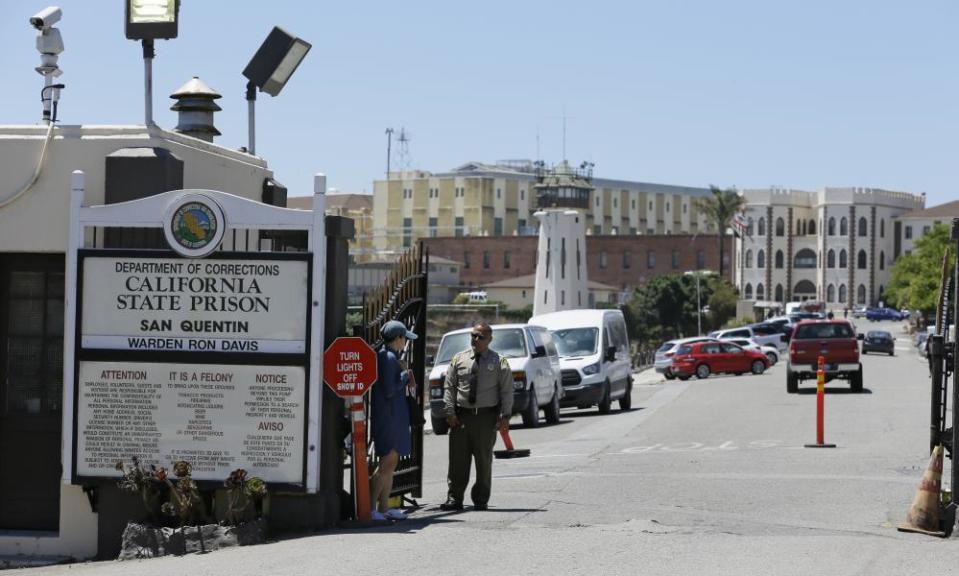California governor grants clemency to 21 prisoners as thousands infected with Covid-19

California’s governor has granted clemency to 21 prisoners as Covid-19 outbreaks have continued to infect thousands behind bars in an escalating public health crisis.
Gavin Newsom, who has faced mounting pressure to release people en masse from state prisons, announced Friday that he is granting commutations to 21 people, a move that reduces their sentences and creates a potential path for their release. He also announced pardon grants for 13 people, a step that restores some rights for those who have already served sentences.
Related: San Quentin: outcry after Covid-19 cases at California prison triple in two weeks
Advocates said the move was deeply inadequate given the scale of the Covid crisis, which has infected more than 4,000 people in state prisons, leading to 20 deaths. The state announced more than 1,000 new cases in the last two weeks, a surge that advocates and experts say was preventable and is a result of the state’s negligence.
The recent outbreaks in two prisons, San Quentin and Corcoran, occurred after officials transferred hundreds of people into those facilities. They came from a prison with the largest outbreak in the state and were not tested first.

Many of the new pardon grants were for people who were convicted and imprisoned as children. Two of the pardons also involve California residents at risk of deportation due to their criminal records. Pardoning their convictions means they are no longer considered eligible for removal from the US under immigration laws.
Related: 'People are sick all around me': inside the coronavirus catastrophe in California prisons
One woman, Ny Nourn, is a survivor of domestic violence who was convicted of second-degree murder when an abusive boyfriend shot and killed someone. She was at risk of deportation to Cambodia, a country she has never been to, and now works as a community organizer in California. Another pardon grantee is Sophea Om, who was already deported to Cambodia in 2011. The pardon would potentially allow Om, who was born in a refugee camp in Thailand, to be reunited with her son, a US citizen.
The commutations, granted to individuals serving life sentences, makes some of them eligible for parole hearings in the coming year. They will not, however, be immediately released, and there is no guarantee they will be able to come home. Out of 44 commutations Newsom has granted since he became governor last year, a majority of them are still incarcerated today, said Colby Lenz, an advocate with the California Coalition for Women Prisoners.
The state has done nothing to prioritize saving the lives of those most vulnerable to death from Covid
Colby Lenz
At the start of the pandemic, Newsom initially allowed for the early release of 3,500 people who were nearing the end of their sentences, but he has since made no large-scale efforts to reduce the prison population in response to the virus. He has also repeatedly refused to use his clemency authority to grant releases for elderly and medically vulnerable people who are at high risk of death.
The routine clemency grants for a handful of people have not made a dent in the overcrowded prison population and are also not preventing the virus outbreaks, said Lenz. “The state has done nothing to prioritize saving the lives of those most vulnerable to death from Covid … Newsom has the power to save lives with a stroke of his pen, and he is shamefully failing to do so. We are raising money for funerals instead of reconnecting families.”
A number of sick and elderly women who are also survivors of abuse and violence recently spoke to the Guardian about their pleas to the governor to come home. On 1 May, the state’s treasurer also sent Newsom a list of 25 women who have active commutation requests as well as housing accommodations and programs waiting for them if they are granted release.
But none of these women were on Newsom’s list Friday, and some remain housed in prisons with ongoing outbreaks.
Patricia Wright, 68, is battling terminal cancer and is currently in chemotherapy, and was placed in isolation this week as Covid-19 spreads at California Institution for Women (CIW), her sister, Chantel Bonet, said Friday. She has months to live. “She says, ‘I’m so scared because I’ve seen them carry people out on stretchers.’ All week she’s been saying she feels worse than ever.”
Wright’s son, Alfey Ramdhan, 37, said Friday he just wanted a chance to spend time with his mother in her final months: “I’d rather for her to die in my arms, to die with me, where her soul can rest, so she can be at ease when she takes her last breath.”
The pardons have also been inadequate given how many people are vulnerable to deportation, but have not been protected by Newsom, said Sarah Lee, an advocate with the Asian Law Caucus (ALC). Although California is a sanctuary state meant to limit collaboration with US Immigration and Customs Enforcement (Ice), the state has continued to transfer dozens of people from the prisons to Ice custody, where there are also major Covid-19 outbreaks.
Lee’s group is currently advocating for the governor to protect Chanthon Bun, an immunocompromised refugee who is due to soon be released from prison – and placed in Ice custody. He was not on Newsom’s pardon list, and activists are calling for the governor to block his transfer to Ice.
“The power of clemency is one of the governor’s most important responsibilities,” said Lee. “If he really cares about Black Lives Matter, he needs to free people.”
Nourn, who was granted a pardon, is also an advocate with ALC and Survived and Punished, a prison abolition group. She thanked the governor in a statement Friday, adding: “I want to ask him to extend clemency to other currently and formerly incarcerated refugees, immigrants and survivors facing deportation like I was.”

